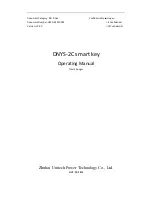
7-2 Physiological Unit Signal
NOTE:
When abnormality is detected in physio trace, please check if ECG leads are properly
connected with the system.
7.1
ECG
7.1.1
ECG Operation Basic Procedures
1.
Connect the device and place ECG electrodes.
Turn off the power supply of the system, and connect the ECG cable to ECG port on the left side
of the main unit.
Turn on the power supply of the system;
Place the ECG electrodes on the patient’s body (as shown in the following figures).
2.
Press <F12 Physio> on the control panel to physio operation interface.
3.
Switch the imaging modes and display formats, adjusting the parameters to get an optimized image.
4.
Parameter adjusting:
In Physio menu, tap [ECG] on the touch screen to enable or disable ECG waveform curve. Adjust the
[Speed], [ECG Gain], [Position] and [Invert].
5.
Trigger:
Select the trigger mode, or tap [Real & Trig] to set the trigger time, triggering delay time and image
display format.
6.
Freeze the triggering image and the curve, and then review them.For details, see
Chapter 13.1.2
.
7.
Exit ECG mode, and remove ECG electrodes from the patient.
8.
Press <Physio> to exit.
7.1.2
ECG Triggering
7.1.2.1
Overview
ECG triggering means that image scanning is activated at some time points of ECG signals, thus
obtaining B images at these time points.The triggering image should be in 2D-mode.
When ECG triggering occurs, some marks (frame triggering mark) appear on the ECG waveform
(relative R wave, the time for delay set), indicating the time points when the 2D images are captured.
NOTE:
The triggering mark is displayed in both freeze mode and live mode
The marks in Dual trigger are in different colors.
Triggering function is unavailable if the ECG trace is disappeared. Only the live 2D image can
be triggered.
No delay time or time interval shall be less than the time required to scan a single image.
I
II
III
RA
LA
LL
RL
I
II
III
N
F
L
R
(a)IEC
? ?
(b)AHA
? ?
















































